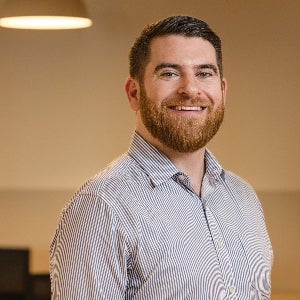This Founder Walked-On to a Top College Basketball Team in the '90s. Today, He and Drew Brees Are Bringing the 'Walk-On Mentality' to Franchising.Brandon Landry was so determined to play college basketball that he walked-on — tried out with no scholarship and made the team — at a major program. He's brought that same determination to the franchise business with Walk-On's Sports Bistreaux.
Key Takeaways
- Brandon Landry's determination and hard work enabled him to walk-on to one of the top basketball programs in the country.
- After basketball, Landry opened Walk-On's Sports Bistreaux in Baton Rouge.
- Drew Brees joined Walk-On's as Landry's partner in 2015 after visiting the New Orleans location.

Brandon Landry, the son of a Louisiana sugar cane farmer, watched a young Shaquille O'Neal breaking backboards for the Louisiana State University Tigers in the early 1990s. Years later, after a high school basketball career that ended with him being recruited by small and mid-level colleges, Landry went to LSU to study business. He also tried out for the basketball team, perennially one of the top programs in the country. "It's human nature to want to prove people wrong," Landry says. "At the time, being 19 years old, a lot of people said, 'This guy can't play college basketball.'"
Those people were wrong. And Landry has taken the lessons he learned while clawing his way onto a top college basketball team through grit, determination and hard work — something he calls the "walk-on mentality" — into franchising withWalk-On's Sports Bistreaux.
Walking on at LSU
Landry didn't find instant success at LSU. "It was a brand new coach, and he was hosting walk-ons to try out," he says. "I tried out, and I got cut." However, that didn't kill his dream of donning the Tigers' purple and gold. He volunteered to play on the practice team, simulating opponents on the court so the Tigers could prepare for upcoming games.
It was an important — if unsung —part of a team's preparation, and Landry's dedication showed. "I just kept working at it. A few months after the practices started, the coach needed players to practice with. So I got the opportunity to go back and practice, and I ended up staying on the team."
“我学到的一切作为一个伟大的队友, being a part of a team, being a part of something bigger than yourself."
Landry spent the next three years with the Tigers. Although he didn't see much playing time, he learned valuable lessons. "I learned everything about being a great teammate, being a part of a team, being a part of something bigger than yourself," he says. "And that's the business philosophy that we've built on. It's all about our culture and teamwork and everybody playing for each other."
Related:Become a Franchise Owner in 5 Easy Steps
Venturing into business
After his college basketball career ended in 2001, Landry was at a crossroads. "I figured I wasn't going to make money playing basketball," he says, "and I didn't want to go into farming." So Landry tapped into an idea he and fellow walk-on Jack Warner had discussed. "It became obvious that we needed a cool sports bar in Baton Rouge near LSU. Why not do it ourselves?"
Landry says the team was on a road trip in March of 1999 when the concept for Walk-On's was born. "We were on the plane home, and we came up with the idea that we're not going to have the normal sports bar food — we're going to have good food. We're going to cater to everyone, not just men drinking beer. We want women, we want children, we want families. And that's really how it started."
"That walk-on mentality kicked in, the same way I got on the team. I just kept trying [and] working at it."
Landry and Warner presented their business plan in an entrepreneurship class, and their professor wasn't exactly enthusiastic. That didn't discourage Landry, though. "That walk-on mentality kicked in, the same way I got on the [LSU] team. I just kept trying [and] working at it. We actually met with that professor a few more times trying to perfect the plan."
After graduation, Landry and Warner began to look for investors, but with no experience in the risky restaurant business, they hit a wall. "We heard, 'Yeah, we love it, but no,' at the first six banks," Landry says. Finally, a从小型l Business Administrationbanker gave the former walk-ons aloan to openthe original Walk-On's Sports Bistreaux.
Related:10 Tips to Go From Employee to Boss, From Franchisees Who Did It
Walk-On's Sports Bistreaux
Soon they located a prime spot in Baton Rouge and began staffing the restaurant.Still, Landry heard negative reactions from many who saw his lack of experience as a harbinger of failure. "When [we'd] talk about the restaurant, everybody was doubting naysayers," he says.
But he can draw parallels between his athletic journey and his path in business. "The feeling when we got the loan was like I made the team. But now, can I stay on it? Can we keep this restaurant open? Can we make it? [We were] working our tails off and trying to learn, so it was very similar when you look at the process of being a walk-on with no scholarship, not a recruited player."
"The feeling when we got the loan was like I made the team."
The first Walk-On's Sports Bistreaux opened in Baton Rouge in 2003. But the plan wasn't fast expansion. Landry says his team took plenty of time to perfect operations before trying to grow.
Expansion, franchising and a famous partner
Landry opened the second Walk-On's in Lafayette, La., in 2008. Three years later, the New Orleans location, which would prove critical to the brand's expansion, opened. "[If] you go to New Orleans, the culinary capital of the country, you better know what you're doing," Landry says. "We were very successful in New Orleans, with Super Bowls, Wrestlemanias and Final Fours, and we're two blocks from the Superdome."
Three years after the New Orleans location opened, a customer who visited Walk-On's loved the place so much he wanted to invest. "We weren't actively trying to go after a celebrity partner," Landry says. "But Drew Brees reached out to me and said he wanted to be a part of Walk-On's, not as a franchisee but as my partner."
Walk-On's VP of marketing, Erin Amadeo, explains that because Brees was a fan first, incorporating him into the company's marketing was seamless: "Having him as an authentic fan of the restaurant makes it easy for us to show him as a genuine leader," she says.
"Of course, the marketability of Drew Brees is awesome."
Brees, who won a Super Bowl with the Saints in 2010 and spent 15 years with the team as one of the NFL's top quarterbacks, opened up new possibilities for Walk-On's. "Of course, the marketability of Drew Brees is awesome," Landry says. "But what it did more for us is that Drew Brees is associated with trust. I think it goes back to credibility. So it's not just pure celebrity; it's more than that."
In 2014, Landry's fellow walk-on and business partner Warner sold out to Landry and left the business. "We had a good 10-year run," Landry says. "We've been close friends and were teammates, then became business partners for over a decade."
Landry decided to franchise the following year, and the first restaurants began opening in 2016. "We had four restaurants at the time, and then the rest is kind of history," Landry says.
Knowing when to step aside
Landry stepped down as CEO of Walk-On's in January, electing to transition into a chair of the board role and turn over the CEO reins to Chris Dawson, who has experience growing established franchises. "I feel like I've done a pretty decent job over the last decade of being the CEO and getting us to where we are now, but I also know what I'm good at and not good at," Landry says. "I'm an entrepreneur; I'm a founder. I'm not the scalable CEO. I think being a good leader is knowing what you're good at. What I think is almost as important, if not more important, is knowing when to step aside."
"Being a good leader is knowing what you're good at. What is almost as important, if not more important, is knowing when to step aside."
Landry explains that the move was about doing what's best for the company — the team — not individuals, even himself. "I could have said, 'Look, I want to stay the CEO [and] make all the decisions. This is my baby, I need to do everything.' Or I could say, 'What's best for the company? Where am I most needed?'"
The franchise has 74 restaurants open and plans for dozens more, including international locations. "We wanted to bring people together," Landry says. "We wanted to inspire that lifestyle that celebrates the underdog mindset, and we've done that. It's that mindset that's been the key to my success."











